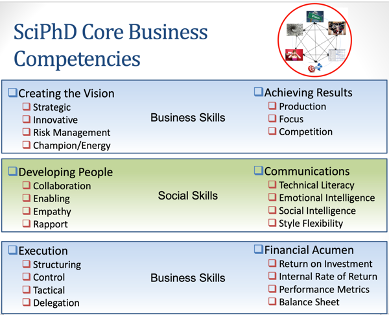The Business of Science module is the foundation for the entire SciPhD Certificate Program. The essential learning objective is that your true value as a PhD scientist in the professional world is a combination of your technical/scientific identity (what you know and do), your business identity (how you do your work) and your social identity (how you work with others). The underlying behaviors and skills that make up your business and social identity are what guarantee high quality work that is performed with attention to deadlines and budgets, and adopting the philosophy that the goals and aspirations of the team and the organization are more important than personal ambitions.
Using this core understanding of three identities, we then analyze the job requirements as defined in job ads through our web application Flamingo™. With Flamingo, we map all the individual requirements into these three categories, and then into our SciPhD Core Business Competencies. To demonstrate the candidate’s qualifications, we then develop experience statements with accomplishments. These statements also assure the hiring manager that the candidate does in fact have the required experience and understanding of the values essential in a team-based organization to be a productive team member.
Finally, Module 1 takes a deep look into the various types of career paths for PhDs, thus unlocking excitement for alternative career paths to pure “hands-on science”. We are saying “Yes” you can compete for jobs in communications, science writing, consulting, customer support, operations, equity research, business development. The result is enthusiastic, highly trained candidates for the broad variety of jobs required in biotechnology-related companies.
Benefits to Students
Students discover the breadth of career path opportunities available to them. They learn how to dissect job descriptions within the Core Competency paths. They can then use that knowledge to identify gaps in their training so they can gain the necessary experience before they do apply for jobs, and competently demonstrate with experiences and accomplishments how and why they are the best candidate for the job in terms of their complete identity (technical, business, social). They are not just technically competent, they also have the appropriate attitude to function in a team-based environment where high quality work is essential to business success.
Benefits to University Graduate and Postdoctoral Programs
SciPhD programs are generally complementary to the impressive suite of programs and training available at many institutions. Module 1 presents a career path ontology to students that reveals opportunities they often have not considered previously, and that best match their intellectual, personality, and professional interests and is also complementary to career paths presented in myIDP.Flamingo’s job analytics training reveals gaps in their knowledge that can guide career development officers to provide directed training in areas of need. Finally, with all training participants having access to Flamingo™, we can provide analytics on career path choices, types of jobs students evaluate, areas of strength and weakness, and much more that can be used to further strengthen existing training programs. SciPhD plans to make programmatic access to these analytics through a new Flamingo interface available to career development offices later in 2024.
Benefit to Companies in Need of Business-Ready Talent
The Business of Science Module 1 provides guidance for new PhDs to pursue career paths that excite them the most and emphasizes the importance of high quality work, meeting deadlines, and working collaboratively for the good of the team. This is of benefit to hiring organizations who recognize that enthusiastic employees are productive employees. Additionally, SciPhD graduates understand what hiring managers and companies value and are prepared to demonstrate those targeted skills with specific experiences and accomplishments, thus making the interview process and candidate selection more efficient.


